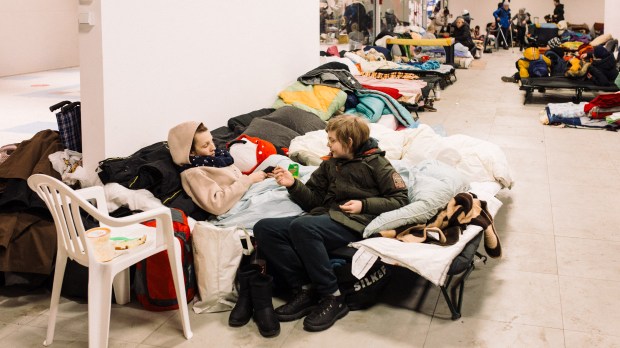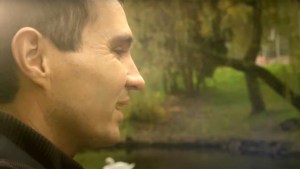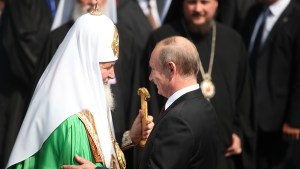As many Ukrainians have pointed out, the war in Ukraine is something that the country has already been living with for eight years, since Russian-backed separatists began agitating for independence in the eastern oblasts of Luhansk and Donetsk. The ensuing conflict, confined to the area known as the Donbas, claimed some 14,000 lives and displaced about 1.5 million people. The need for humanitarian aid never went away in the mostly low-simmering war. Among the Catholic aid agencies on the ground there was Malteser International, which beginning in 2015 has provided assistance to the suffering.
Since the February 24 invasion of Ukraine by Russian troops, however, most of Malteser’s projects in the Donbas have been put on hold. But counselors working for Malteser, which is the Order of Malta’s charitable and humanitarian agency, continue to provide “virtual” psychosocial and mental health support to people in the Donbas. One can imagine such a need has intensified as people who have not evacuated the area suffer the stress, trauma, and anxiety of all-out warfare.
But people fleeing to Western Ukraine are also suffering from stress, as Malteser, with offices long established in the city of Lviv, can attest. Like other aid agencies, Malteser is meeting the hordes of people coming into the train station of Lviv, a city that is so far largely untouched by actual warfare.
“There’s a lot of stress, a lot of trauma and a lot of panic,” said Malteser International Americas spokeswoman Sara Villoresi. “Pavlo Titko, the representative of Malteser Ukraine, has been pretty vocal about just how much of a retraumatization this has been for so many people,” she said. “That’s been one of the biggest issues beyond the largest issue, which is safety right now.”
The agency is providing basics such as hot beverages, food and water, blankets and safe shelter.
Though many are heading toward countries like Poland, Hungary, Romania, the Czech Republic and Moldova – the U.N. estimates there are over 1.5 million so far – many are staying in Ukraine, as well. “Their safety and the safety of our staff is paramount,” Villoresi said.
Faith and Hope
Many locals in Lviv have come forward to volunteer, and Malteser is training people to perform emergency medical care. “I think about 800 people have been trained there in the past couple of days,” Villoresi said.
Malteser also operates in Ivano-Frankivsk, a city southeast of Lviv, where it set up a temporary emergency shelter for internally displaced persons. The facility has about 250 beds and a soup kitchen.
The agency also has operations at border checkpoints, where long lines of cars trying to cross into Poland or Hungary mean it can take a person two or three days to get through. Others are going by foot or by train. At the checkpoints, Malteser provides medical assistance and first aid. The agency also has set up emergency medical and food check points on the other side of these borders.
One small example of the aid Malteser is providing is a 40-year-old woman named Natalia, who fled to Poland with her 16-year-old twins, Vera and Nadja [their names mean faith and hope]. Malteser workers met her at the border in the medical station of the Order of Malta Poland, where she was treated for kidney problems. But she said that the stress she has felt since the war escalated last month is indescribable. She had to say goodbye to her husband for an uncertain time, as most Ukrainian men under 60 are being required to join the military. “In our tent, Natalia and her daughters warm up with hot tea,” Villoresi related. “Vera and Nadja receive psychological care from the psychologist. To distract themselves, they paint pictures. Natalia embroiders. For seven hours they are with us in the tent. Then the journey continues: they are picked up by relatives who live in Poland.”
Dire need for humanitarian corridors
But Malteser recognizes that in some parts of Ukraine right now, the situation is dire, such as in besieged Mariupol, where residents are without food, water, and head.
“There’s no electricity, no heating, no telephone connection. It is absolute horror,” Petro Andryushchenko, an adviser to the mayor of Mariupol, told the New York Times. “People drink from puddles in the streets.”
Or on the outskirts of Kyiv, where civilians trying to flee the relative safety of the capital were killed by mortar fire.
Like other agencies and governments, Malteser is calling for humanitarian corridors to be established and respected, allowing civilians to escape such horrors.
“May humanitarian corridors be created!” said Major Archbishop Sviatoslav Shevchuk of the Ukrainian Greek Catholic Church on Saturday. “May there be green corridors of life so that the peaceful population might pass to safe places and humanitarian convoys might bring those people food, warmth, and human solidarity.”



